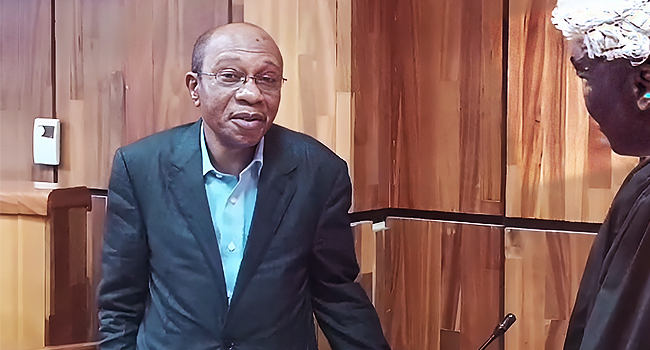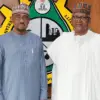The Economic and Financial Crimes Commission (EFCC) has announced that the Lagos State Special Offences Court in Ikeja has admitted additional evidence in the ongoing trial of former Governor of the Central Bank of Nigeria (CBN), Godwin Emefiele, over an alleged $4.5 billion fraud.
In a statement issued on Thursday, the EFCC disclosed that Justice Rahman Oshodi admitted the fresh evidence during proceedings held on October 9, 2025.
“Justice Rahman Oshodi of the Special Offences Court sitting in Ikeja, Lagos, on October 9, 2025, admitted more evidence against a former Governor of the Central Bank of Nigeria (CBN), Godwin Emefiele, in an alleged $4.5bn fraud,” the statement read.
Emefiele is currently facing a 19-count charge filed by the EFCC, accusing him of soliciting and receiving unlawful gratifications during his time as head of the apex bank. His co-defendant, Henry Omoile, faces a separate three-count charge related to the illegal acceptance of gifts by a public official.
The court has adjourned the matter to December 2 and 3, 2025, for a mini-trial, following continuing legal arguments over the admissibility of certain evidence.
Thursday’s ruling marks another key development in the ongoing prosecution of Emefiele, who was first arraigned in December 2023 after a lengthy investigation into alleged abuse of office, corruption, and financial misconduct during his nine-year tenure as CBN Governor.
Appointed in 2014 by former President Goodluck Jonathan and retained by President Muhammadu Buhari, Emefiele’s stewardship at the CBN was marked by several controversial policies. Chief among them was the 2023 naira redesign initiative and cash withdrawal limits, which triggered public backlash and widespread economic disruption.
While the EFCC maintains that Emefiele oversaw large-scale financial misconduct, the former CBN boss has consistently denied any wrongdoing, insisting that his actions were lawful and taken in the national interest.
During earlier hearings, the EFCC tendered multiple documents and digital communications, including WhatsApp messages allegedly retrieved from a mobile device linked to Emefiele. The defence, however, has repeatedly challenged the admissibility of this material, arguing that it was obtained without due process or proper certification.
A key point of contention remains the forensic analysis of one of the digital devices—reportedly an iPhone—with both prosecution and defence disputing the methodology used and the extent of access granted to forensic experts.
The EFCC has also alleged that significant sums—running into billions of naira and various foreign currencies—were traced to accounts and properties linked to Emefiele. In 2024, a Federal High Court in Lagos ordered the interim forfeiture of over $4.7 million, ₦830 million, and multiple high-value properties connected to the former CBN chief. Another court subsequently granted final forfeiture orders for assets valued at more than ₦12 billion.
Despite mounting legal challenges, Emefiele has continued to maintain his innocence, arguing that all financial decisions and policies enacted under his leadership were made within the bounds of the law and with the country’s best interest in mind.
Following his suspension and arrest by the Department of State Services (DSS) in mid-2023, Emefiele was re-arraigned on multiple amended charges, including fraud, abuse of office, and unlawful enrichment. The case remains one of the most high-profile anti-corruption trials in recent Nigerian history.


